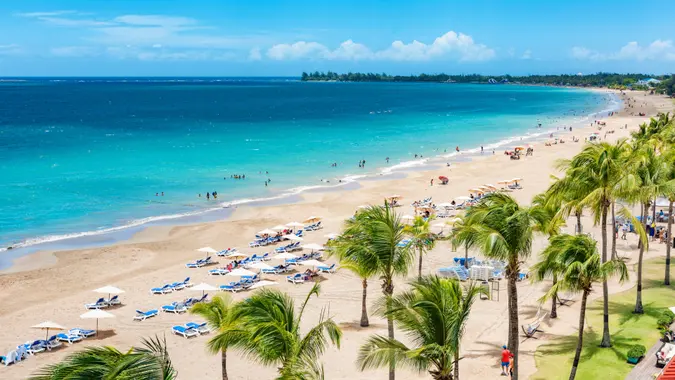5 Sneaky Ways Most People Waste Money When Booking a Trip

Commitment to Our Readers
GOBankingRates' editorial team is committed to bringing you unbiased reviews and information. We use data-driven methodologies to evaluate financial products and services - our reviews and ratings are not influenced by advertisers. You can read more about our editorial guidelines and our products and services review methodology.

20 Years
Helping You Live Richer

Reviewed
by Experts

Trusted by
Millions of Readers
When you’re planning a trip, it’s easier to waste money than you might think — and not just on silly souvenirs, like that random gas station snowglobe. There are a lot of expenses that can sneak up on you. You don’t register how much you’ve spent until your credit card statement arrives, bringing with it a lot of bad news about your good times.
It doesn’t have to be this way. Understanding how you can accidentally overspend is the first step in avoiding it. These are some of the sneaky ways most people waste money when booking a trip.
1. Straying From the Original Plans And Budget
After a lifetime of listening to showtunes in your car, you’ve finally made it to Broadway. Well, to see the shows at least (even if your carpool team thinks you’ve got the chops to audition). You’ve budgeted everything carefully, getting a hotel near the theaters to avoid excessive cab fees while snapping up your tickets in advance.
You planned to get cheaper meals to avoid overspending — but then you saw that ad for that four-star restaurant that New York Magazine® just raved about. So, you go that night. And every night after, until it’s time to head back home. Your carefully-assembled budget has now ballooned by hundreds of dollars.
Regardless of the scenario, deviating too much from your original plans and budget can end up costing you. Setting aside a little extra money for spontaneity can help alleviate this issue, but ultimately, you’re going to need to stick to your budget as best you can.
2. Not Booking Your Hotels on the Best Day
You may believe it doesn’t matter when you book your hotel stay, but au contraire — the day you book can help you save money. If, in your haste to simply get it over with, you don’t research the most cost-effective time to start your stay, you could end up paying extra.
Here’s a helpful place to start: Kayak® says domestic travelers booking on a Sunday not only avoid the weekend vacationers and business travelers, but they’re also more likely to get a cheaper rate. Starting your stay on a Friday is inadvisable, since rates are generally higher for weekend guests.
3. Not Using A Rewards Card
Using a rewards card can make traveling far less expensive. For example, the Navy Federal Credit Union More Rewards American Express® card earns members three times the points at restaurants, fast food delivery, supermarkets, plus three times the points for gas and transit1.
The card can also get you up to 25% off with major car rental companies, as well as coverage if a car rented in the U.S. or Canada should be damaged or lost2.
Best of all, you can continue to accrue points for as long as you want to — as long as your account is open, your rewards won’t expire. You can keep saving your points until you’ve planned your dream vacation, and redeem them when you’re ready.
Plus, the card has no annual fees, balance transfer fees, foreign transaction fees or cash advance fees3.
4. Thinking More Expensive Activities Are More Fun
A lot of people may not realize they’re subconsciously planning their vacations around how Instagram-worthy it will be. They want to dazzle friends and family with exotic locations and impressive experiences. Of course, these locations and experiences also come with hefty price tags.
You shouldn’t go into debt to afford your vacation. Not when there are likely a lot of other destinations near you that offer just as much fun for a lower price, from natural locations like hiking trails and beaches to cultural hotspots like museums and theater. Instead of opting for a vacation that will give you “bragging rights,” you should research more affordable destinations. You might even find that they’re worthy of the ‘gram in their own right.
5. Flying Instead of Driving
Your vacation isn’t more fun or exotic just because you got on a flight instead of taking a road trip. But it may be more expensive. There’s a reason why the road trip is a classic American vacation — it gives you a chance to explore new areas of the country, while finding destinations with discounted, or even free, entry.
Bottom Line
Vacation costs can creep up on you, putting a damper on what should be a fun time. However, sticking to your budget and embracing off-the-beaten path opportunities can help you enjoy yourself while minimizing expenses. Using the Navy Federal Credit Union More Rewards card can help keep the good times going through great discounts, as well as points at restaurants, fast food delivery, supermarket and on gas and transit1.
* The Navy Federal More Rewards American Express® Card is issued and administered by Navy Federal Credit Union. American Express® is a federally registered service mark of American Express and is used by the issuer pursuant to a license.
** All product and company names and logos are trademarks™ or registered® trademarks of their respective holders. Use of them does not imply any affiliation with or endorsement by them.
1 Navy Federal More Rewards American Express® Cards earn 3 points for every $1 of eligible purchases made for gas, transit, restaurants, food delivery, and supermarkets, and 1 point for every $1 of other eligible purchases. Eligible purchases are purchases for goods and services, minus returns and other credits. Eligible purchases do not include fees, interest charges, balance transfers, gambling, convenience checks, cash advances, or other cash-equivalents (e.g., money orders, gift cards, prepaid cards). Merchants are assigned codes by payment networks based on what they primarily sell. We rely on this information to identify gas, transit, restaurants, food delivery, and supermarket purchases. If the purchase is not identified as a gas, transit, restaurant, food delivery, or supermarket purchase, it will not receive additional points. For example, purchases for transit that are identified as railway, ferries/water trip, taxi, limousines, bus lines, charters, tour buses, tolls, road/bridge fees, and parking/lots will receive 3 points for every $1 spent. However, purchases at restaurants located within another establishment (e.g., hotel, casino, commissary, grocery store, event venue), and purchases for gas at superstores, supermarkets, and warehouse clubs, may earn 1 point per $1 spent because they typically are not assigned codes identifying them as restaurant or gas purchases (for existing accounts, these transactions may receive additional points from a different promotion if one applies to your account.) For more information, view the More Rewards American Express® Card Program Description at navyfederal.org.
2 Certain terms, restrictions, and exclusions apply. For more information, please refer to the More Rewards American Express® Card Guide to Benefits.3 As of 02/03/2025, rates range from 14.90% APR to 18.00% APR, are based on creditworthiness, and will vary with the market based on the U.S. Prime Rate. ATM cash advance fees: None, if performed at a Navy Federal branch or ATM. Otherwise, $0.50 per domestic transaction or $1.00 per foreign transaction.
 Written by
Written by  Edited by
Edited by 

























